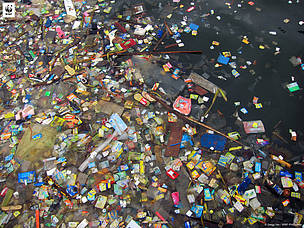UNEA-3: Global leadership on pollution, ambiguity on biodiversity
Significant progress was made at the 3rd United Nations Environment Assembly (UNEA-3) that closed in Nairobi on Wednesday. The international community showed a deepened understanding that economic, social and environmental concerns are unforgivingly interlinked, and acted decisively to adopt a Ministerial Declaration with standing ovations. By doing so, member states committed to increase efforts to prevent, mitigate and combat pollution which is threatening our well-being and survival and sustainable development.

Ocean plastic trash
The clear focus of UNEA-3 led to the much-needed global consensus on the importance and urgency of tackling pollution of all forms, including the flow of plastic into the ocean. This paves the way for national governments to act on marine litter, microplastics, air and water pollution and many others and could also encourage businesses to innovate the sustainable solutions and alternatives that millions of consumers are already demanding. WWF, however, calls to ensure the effective implementation and follow-up on all outcomes of UNEA-3, including the voluntary commitments and pledges to end pollution.
Unfortunately, one global crisis failed to receive much attention at the assembly. Fuelled by pollution, climate change, deforestation and overexploitation, people are heading into a never before seen crisis. The loss of nature & biodiversity will dramatically impact our essential needs for fresh water, clean air and food security. WWF estimates that the world has seen a 58 per cent[1] decline in wildlife since 1970. Marco Lambertini, Director General of WWF International, said “Loss of biodiversity at this rate is not just sad, it is dangerous. Biodiversity is the foundation for the vital services nature provides to us, our well-being and the economy.” WWF urges placing biodiversity at the top of the international agenda and for member states to take the critical steps needed to stop the loss of nature by 2020.
WWF strongly welcomes the strengthening of UNEA’s role as the world’s highest-level decision-making body on the environment. Lin Li, Director, Global Policy and Advocacy, WWF International, said: “Voluntary commitments by individuals, corporates and national governments lead the way to best practice, but only strong national and international governance can turn these initiatives into the mass-scale, global action that is needed.”
Source: World Wildlife Fund
- 289 reads
Human Rights
Ringing FOWPAL’s Peace Bell for the World:Nobel Peace Prize Laureates’ Visions and Actions

Protecting the World’s Cultural Diversity for a Sustainable Future

The Peace Bell Resonates at the 27th Eurasian Economic Summit

Declaration of World Day of the Power of Hope Endorsed by People in 158 Nations

Puppet Show I International Friendship Day 2020

